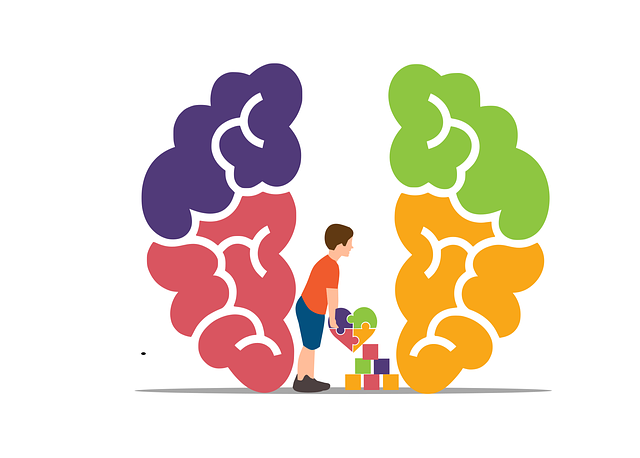Community Outreach Programs, like those offered by Littleton Interpersonal Issues Therapy (LIIT), play a vital role in making mental health services accessible to underserved populations by bringing support directly into community settings. These programs encourage early intervention, improve individual mental wellness, and foster a supportive community through tailored guidance and a sense of belonging. LIIT combines stigma reduction, compassion cultivation, and emotional intelligence training to create safe spaces for emotional support and stronger relationships. Collaborative partnerships with local organizations enable culturally sensitive, accessible, and effective programs that address specific interpersonal challenges in the Littleton community. Evaluating these programs focuses on long-term positive changes in social skills, emotional regulation, mental well-being, engagement, and reduced interpersonal issues, ensuring tailored care that builds trust and strengthens community bonds.
Community outreach programs, such as Littleton Interpersonal Issues Therapy initiatives, play a pivotal role in enhancing mental health services accessibility. By reaching out to communities directly, these programs address interpersonal challenges, fostering healthier environments. This article explores the multifaceted benefits of community outreach, offering insights into designing and implementing successful strategies. We’ll delve into tips for engagement and provide guidance on measuring the impact of Littleton Interpersonal Issues Therapy initiatives to ensure their long-term effectiveness.
- Understanding Community Outreach Programs: Their Role and Benefits
- Designing Effective Littleton Interpersonal Issues Therapy Initiatives
- Implementing Outreach Strategies: Tips for Success and Engagement
- Measuring Impact: Evaluating the Effectiveness of Community Therapy Programs
Understanding Community Outreach Programs: Their Role and Benefits

Community Outreach Programs play a pivotal role in fostering connections and addressing interpersonal issues within local communities, including Littleton Interpersonal Issues Therapy’s target areas. These initiatives aim to bridge the gap between mental health services and those who may be facing barriers to access or are underserved. By extending support directly into community settings, programs can enhance accessibility and promote early intervention for various challenges, from anxiety relief to emotional regulation.
Through such outreach, individuals can receive guidance tailored to their unique circumstances, leading to improved mental wellness. This approach also fosters a sense of belonging and community, which is essential for overall well-being. For instance, the production of a Mental Wellness Podcast Series can engage listeners in discussions on managing stress, cultivating resilience, and navigating life’s challenges, all while contributing to a more informed and supportive community.
Designing Effective Littleton Interpersonal Issues Therapy Initiatives

Effective Littleton Interpersonal Issues Therapy initiatives require a nuanced approach that addresses both individual and community needs. By integrating Mental Illness Stigma Reduction Efforts, these programs can foster an environment where individuals feel comfortable seeking support for their emotional well-being. Encouraging Compassion Cultivation Practices and promoting Emotional Intelligence are pivotal strategies within these therapies. These practices not only enhance self-awareness but also strengthen relationships, leading to more robust social connections and improved mental health outcomes.
Through collaborative partnerships with local organizations and community leaders, therapy initiatives can be tailored to address specific interpersonal challenges prevalent in the Littleton setting. This personalized approach ensures that programs are relevant, accessible, and culturally sensitive, thereby increasing participation rates and maximizing positive impacts on individuals’ lives.
Implementing Outreach Strategies: Tips for Success and Engagement

Implementing outreach strategies effectively requires a thoughtful approach to engage and connect with the community. For organizations like Littleton Interpersonal Issues Therapy, success lies in understanding the unique needs and challenges faced by the target audience. Personalizing your outreach methods ensures that efforts resonate with individuals on a deeper level, fostering genuine interest and participation.
Focus on building relationships through meaningful interactions. This could involve hosting educational workshops, offering peer support groups, or partnering with local community centers to address interpersonal issues and promote mental well-being. Engaging in Depression Prevention initiatives, Inner Strength Development programs, and Mental Illness Stigma Reduction Efforts can create a supportive environment, encouraging open dialogue and fostering a sense of belonging. By adopting these strategies, outreach programs become powerful tools for community transformation.
Measuring Impact: Evaluating the Effectiveness of Community Therapy Programs

Evaluating the impact and effectiveness of community outreach programs, such as Littleton Interpersonal Issues Therapy, is crucial for understanding their long-term success and potential to transform lives. Beyond quantifiable outcomes like attendance rates or number of participants, these programs should aim to foster positive changes in individuals’ social skills training and emotional regulation abilities. By measuring improvements in mental well-being, community engagement, and reduced interpersonal issues, therapists can gauge the program’s holistic impact on the target population.
Cultural sensitivity in mental healthcare practice plays a pivotal role in this evaluation process. Recognizing and addressing diverse cultural needs ensures that outreach programs resonate with participants from various backgrounds, fostering trust and encouraging open dialogue. This tailored approach not only enhances the effectiveness of therapy but also strengthens community bonds by promoting understanding and empathy among individuals grappling with interpersonal issues.
Community outreach programs, such as Littleton Interpersonal Issues Therapy initiatives, play a pivotal role in enhancing community well-being. By effectively designing and implementing these strategies, we can foster stronger connections, improve mental health, and create lasting positive change. Measuring the impact of these programs is essential to ensure their continuous improvement and success in meeting the diverse needs of communities they serve. Through dedication and thoughtful engagement, outreach initiatives have the potential to revolutionize access to therapy and significantly enhance the lives of those within their reach.














